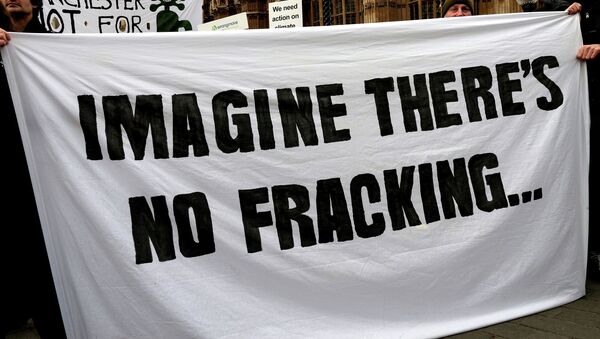The British Geological Society confirmed that an earthquake with a magnitude of 2.9 was recorded in Hampshire at around 18:30 GMT.
And then, at around 22:30 GMT, a second earthquake measuring 3.8 on the Richter scale rattled the East Midlands village of Cottesmore in Rutland, according to the US Geological Survey. And what did people do — they tweeted about it, naturally.
"It was quite scary, we didn't know what it was, so we went on Facebook and Twitter and everyone was saying the same thing — that it was an earthquake," Naomi Morgan told Sputnik UK. "But there was no damage — apart from the pot".
Crack in pot gets slightly larger #Rutland #Earthquake pic.twitter.com/lS0B0p546w
— Owen Morgan (@MosaicGardens) January 29, 2015
Fracking involves blasting rocks underground with powerful injections of water, sand and chemicals. This fractures the rock in the shale strata, which releases a gas that can be collected from the head of a well.
But fracking related earthquakes aren't just to be tweeted about — in some areas, they are a reality.
An #earthquake in the Lincs/Cambs area. Right who has been doing some amateur fracking?
— Rae Earl (@RaeEarl) January 28, 2015
In 2011, it emerged that fracking tests near Lancashire in the north west of England were the likely cause of earthquakes in the area. Energy firm Cuadrilla said that shale test drilling had triggered the earth tremors, which didn't go down well with people living in Blackpool.
Earthquake of 3.8 magnitude rattles Rutland http://t.co/GpqrHqwdcC < I hear it when I went out to the bins. Unusual rumbling sound.
— @trabasack Duncan E. (@trabasack) January 29, 2015
However, the two earthquakes within two days of each other are unlikely to be caused by fracking, according to Frack Off — a group that aims to stop the extraction of unconventional resources in the UK.
Andrew West, a campaigner from Frack Off told Sputnik UK:
"It's unlikely that these earth tremors are to do with hydraulic fracturing. However the license map shows that there's some conventional oil and gas exploration and coal mining in that area".
"It would be difficult to prove an association between this small scale activity and the earthquake", according to West.
"Onshore oil/gas and coal mining activity in the UK is tiny compared to other countries".
The government has made 60% of the UK available to fracking companies, says West. "Lots of people aren't even aware that they already live in license areas".
Frack Off is concerned that if more licenses are issued and exploration activity (drilling) expands to cover more of the UK, then bigger companies will move in.
"Areas like Lancashire are in the forefront right now but unless these unconventional technologies are resisted everywhere they threaten to industrialise massive areas of the UK", says Frack Off campaigner Andrew West.
Where There's Fracking, There's Friction
Last year Cuadrilla's decision to drill in West Sussex prompted mass protests — with Green Party MP for Brighton Pavilion, Caroline Lucas — whose party is fiercely anti-fracking, being arrested in Balcombe.
Caroline Lucas and her son have just been arrested blockading #Cuadrilla in #Balcombe pic.twitter.com/solaKYLn18
— No Dash for Gas (@nodashforgas) August 19, 2013
British Prime Minister David Cameron says the government was going ‘all out' for shale gas and the benefits from the industry could be ‘enormous for the country'.
But public opinion on fracking remains split, causing friction in communities — not necessarily earthquakes.


